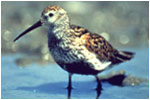| |
|
Goals and Objectives 
This web site and the Electronic Field Trip is designed for students, non-formal groups, and all who want to learn about shorebirds. Students, non-formal groups, and others will learn that they can make a difference by understanding shorebird migration, wetland habitats, and what we can all do to protect these valuable natural resources.
GOALS
Shorebirds
Students will learn how shorebirds are adapted to live in wetland habitats and are an important part of the wetland environment.
Wetlands
Shorebirds depend on healthy, abundant chains of wetland habitats. Students will also learn why wetlands are important to humans and how humans protect and affect wetland habitats. Wetlands are found in many places including neighborhood parks, farms, National Forests, and wildlife refuges in the United States and around the world.
Migration
Students will learn that the success of a shorebird's journey depends on wetlands for wintering, migration stopovers, and nesting habitat.
The International Connection
Your class will see how they are a part of the international connection between shorebirds, migration, and wetland habitats. There are no borders to wetland and shorebird conservation. Even urban and suburban dwellers can help protect wetlands.
OBJECTIVES
By the end of the WEBCAST students and others will be able to:
- Describe how shorebirds are uniquely adpated to live in wetlands.
- List the three habitat areas shorebirds need for a successful life cycle.
- Explain why shorebirds depend on wetlands in these three habitats areas for a successsful life cycle.
- Demonstrate that students can help wetlands by developing a class project that shares their new knowledge with others or helps protect a local wetland.
This broadcast and the LESSON PLANS/ACTIVITIES on thise web cover the following subject areas:
- Life Science
- Enviornmental Science
- Earth Science
- Ecology
- Geography
- Language Arts
|
|
- Mathmatics
- Government
- Economics
- Social Studies
- Art
|
Students will use the following skills by participating in the broadcast and activities on the Web:
- Comparing
- Evaluation
- Observing
- Predicting
- Gathering and organizing information
- Interpreting and applying information
- Drawing conclusions
- Creative writing
|
|
- Drawing
- Discussing
- Debating
- Reading
- Communicating
- Inferring
- Understanding cause and effect
|
|
|
|
|
